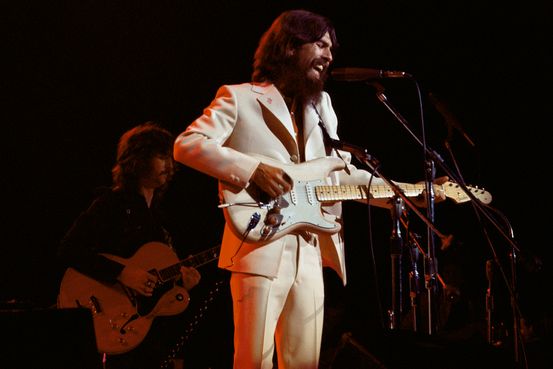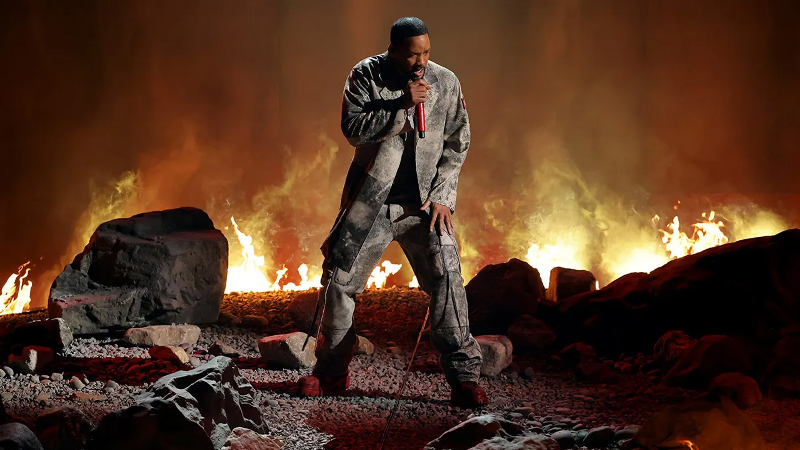
'GEORGE HARRISON' REVIEW: WHY HIS GUITAR GENTLY WEPT
The paradoxes of George Harrison’s career can perplex even the most casual Beatles fans. Taken together the contradictions are as much a part of the band’s legend as John Lennon’s solipsism or Paul McCartney’s eagerness to please. Here, after all, was a global pop star who played lead guitar in the most influential group in history and yet was regarded as its invisible man. He was a paid-up antimaterialist whose first significant Beatles song, “Taxman,” was a scarifying assault on the U.K. tax regime, and a sharp-eyed scourge of selfishness (see his final contribution to the Beatles’ oeuvre, “I Me Mine”) whose emotional life seems to have been a gargantuan exercise in having your cake and eating it. Being in the Fab Four might have given Harrison (1943-2001) fame, wealth and boundless opportunity, but as Philip Norman shows in this absorbing biography, the burden it placed on his far-from-resilient shoulders stayed with him for the rest of his life.
Mr. Norman, whose grapplings with the Fabs go back as far as “Shout! The Beatles in Their Generation” (1981), is sensitive to these motivational tangles, and also to another of his subject’s defining characteristics. One of the most ominous subtexts of “George Harrison: The Reluctant Beatle,” it turns out, is the sense of a man grown old before his time. Hospitalized for six weeks at the age of 13 with nephritis, a martyr to swollen tonsils and on-tour exhaustion, he spent much of his early life being ill. The Beatles’ 1964 U.S. debut on “The Ed Sullivan Show” was very nearly canceled when Harrison went down with strep throat, and Mr. Norman offers a bleak little vignette of him out on a mid-’70s American jaunt—thin, strung-out and sallow from too many cigarettes and too much pixie dust. Monty Python’s Eric Idle, who met him at around this time, reckoned that even here in his early 30s he was “preparing to die.”
And to self-contradiction and ill-health can be added a series of implacable resentments, at least one of them dating back to childhood. The Harrisons—working-class, clannish and keenly supportive of their showbiz-inclined son—were from the Liverpool suburb of Speke; the teenage George assumed that opportunity would always be denied him “because I was from Liverpool.” Once the Beatles got properly going in 1962-63, and possibly even before, anxiety about his upbringing gave way to the condescension of bandmates and studio collaborators. Lennon and Mr. McCartney belittled his early compositions and Mr. McCartney, in particular, was not above wresting a guitar from Harrison’s hands and playing the solo himself if he thought Harrison was taking too long on the job. Excluded from very much involvement in “Sgt. Pepper’s Lonely Hearts Club Band” (1967), Harrison later claimed that the decade-defining album left him cold.
Worse, perhaps, the fog of patronage that hung over Harrison’s career as a Beatle extended to George Martin, the band’s producer; Martin gamely conceded that “I was always rather beastly to George.” All this, as Mr. Norman shows in ravishing detail, would lead to trouble and also to an unexpected creative flowering. While Harrison emerged from the Beatles’ bitter—and bitterly litigious—breakup in 1970 with an outsize chip on his shoulder (“I had no confidence in myself, having spent so many years with Paul McCartney,” he told an interviewer around this time, “ ’cause he ruined me as a guitar player”), he brought with him a cache of songs that in some cases went back to the mid-’60s. Most of this material was parlayed onto “All Things Must Pass” (1970), a luxuriant triple album that topped the charts on both sides of the Atlantic and put his onetime colleagues firmly, if temporarily, in the shade.
To the new “serious” LP-buying public of the early 1970s, Harrison was a highly attractive proposition. The spiritualism he had discovered on his trips to the East (with and without his fellow Beatles), his collaborations with the Indian sitar-guru Ravi Shankar, the humanitarianism that led him to mount the hugely successful “Concert for Bangladesh,” staged with an all-star cast at Madison Square Garden in 1971—all this, for a brief period, while Lennon and Mr. McCartney struggled to come to grips with their status in a post-Fab world, made Harrison the ex-Beatle most likely to succeed. That he didn’t, or rather that he failed to match the potency of his previous career, is the subject of Mr. Norman’s second stretch.
Each part of the book, it should be said, presents its author with its own serious challenge. If Part 1 has Mr. Norman trying to cut the least charismatic Beatle out of the herd and make him a personality on his own terms, then Part 2—when the subject finally emerges blinking into the spotlight—is in some ways even trickier to negotiate. To pore over the last quarter century of Harrison’s life is, in the end, to remark its faint air of desultoriness. The albums slip further and further off the pace, although there was an invigorating late-period collaboration with Bob Dylan, Roy Orbison, et al., as the Traveling Wilburys. The personal life, once Harrison’s first wife, Pattie, has gone off with his best friend, Eric Clapton, settles down to a monogamous (with lapses) relationship with her successor, Olivia Arias. The business ventures . . . well, what is it about pop stars that invariably sees them falling in with the wrong people, getting sweet-talked and bamboozled, and ending up only just on the right side of bankruptcy?
Harrison’s particular wrong turn was into a partnership with an attorney named Denis O’Brien, whom he later sued for fraud. The near-collapse of HandMade Films, which Harrison co-founded with O’Brien to help Monty Python make “Life of Brian,” at one time looked as if it might leave him personally liable for a £32 million debt, equivalent to $38.8 million. There were creative fractures too: Even the success of “All Things Must Pass” was tainted by a plagiarism suit over the lead single, “My Sweet Lord.” Come the 1990s, the effects of a lifetime’s chain-smoking began making their presence felt; in 1999 he was lucky to survive a frenzied stabbing attack by a schizophrenic intruder. In another 20 months the cancer that had already seen him lose part of a lung returned, and he was dead at 58.
Mr. Norman is careful not to overdo Harrison’s gloom: More cheerful sides are on display in the wide-eyed letters home from Beatle-era California and incognito trips to India with Pattie. As for that failure to follow Mr. McCartney’s path to world superstardom, if two explanations lie in lack of stamina and personal charisma, then a third can be found in Harrison’s steely sense of self-preservation; you suspect that he never wanted that success in the first place. Meanwhile, the great strength of “George Harrison: The Reluctant Beatle” is its eye for period detail. Apparently, George’s first date with Pattie took place at London’s Garrick Club (“a bastion of male traditionalism”) under the vigilant eye of the Beatles’ manager, Brian Epstein. It followed Harrison’s 21st birthday, which produced no fewer than 52 “sacks of congratulatory fan mail”—a real trumpet-blast from the old-style celebrity steeple, to whose echoes our modern pop stars are still enviously in thrall.
2023-10-20T15:41:43Z dg43tfdfdgfd
